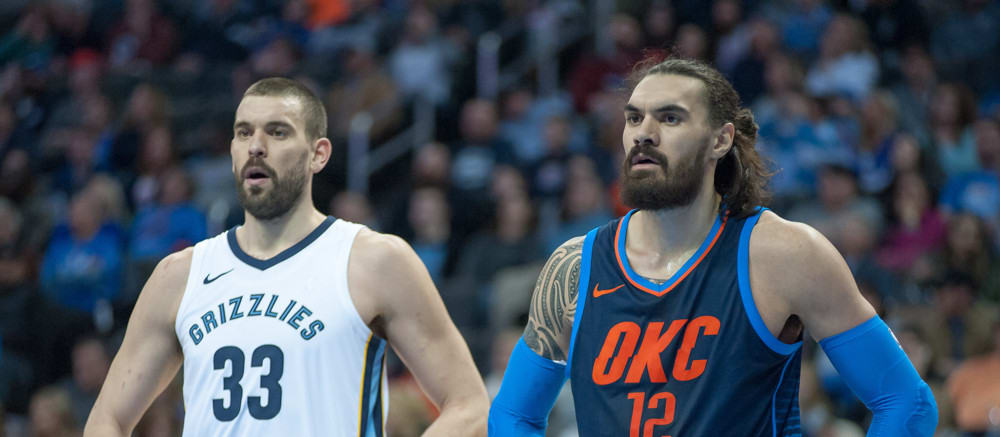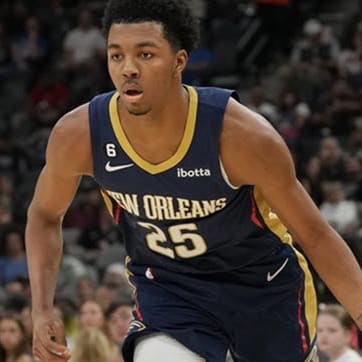This article is part of our NBA Draft Kit series.
You play to win the game. It doesn't matter what the final score is, or how your get there. You play to win the game.
In head-to-head fantasy leagues, a 5-4 win is just as good as 6-3 or 8-1. The core concept of punting categories is based on that basic premise. The idea is that by deliberately ceding some categories, managers will be better able to win the majority of what is left.
The Strategic Advantage Of Punting
The basic idea of punting may seem straightforward, but there are several advantages to punting, and understanding all of them makes it easier for managers take full advantage of the strategy.The most obvious advantage to punting is that it limits the field of competition each week. When two non-punting teams face-off, they are beginning a fight on nine distinct battlefields, most of which have uncertain outcomes. Management of the battle is complex, and the large number of separate conquests means there are a large number of areas that could yield unexpected outcomes. A team that punts, however, is competing on fewer battlefields, as the team is likely elite in some categories and dreadful in others. A punting team may enter each week almost certain of at least a 2-1 record, and only have to compete in the remaining six categories. Furthermore, the punting team has been built specifically to fight in those six each week, adding further advantage.
Another important advantage of punting is that managers are not wasting production
You play to win the game. It doesn't matter what the final score is, or how your get there. You play to win the game.
In head-to-head fantasy leagues, a 5-4 win is just as good as 6-3 or 8-1. The core concept of punting categories is based on that basic premise. The idea is that by deliberately ceding some categories, managers will be better able to win the majority of what is left.
The Strategic Advantage Of Punting
The basic idea of punting may seem straightforward, but there are several advantages to punting, and understanding all of them makes it easier for managers take full advantage of the strategy.The most obvious advantage to punting is that it limits the field of competition each week. When two non-punting teams face-off, they are beginning a fight on nine distinct battlefields, most of which have uncertain outcomes. Management of the battle is complex, and the large number of separate conquests means there are a large number of areas that could yield unexpected outcomes. A team that punts, however, is competing on fewer battlefields, as the team is likely elite in some categories and dreadful in others. A punting team may enter each week almost certain of at least a 2-1 record, and only have to compete in the remaining six categories. Furthermore, the punting team has been built specifically to fight in those six each week, adding further advantage.
Another important advantage of punting is that managers are not wasting production on categories that they do not need to stay competitive. This is most relevant on draft day, but it is also relevant for managers assessing trades and waiver acquisitions. Thaddeus Young is a player I've argued is vastly undervalued in drafts right now, but that doesn't apply to teams punting steals. Young's current valuation is buoyed by his thievery, so he's actually unreasonably expensive for a manager punting steals.
The flip side of not overpaying for wasted production is that punting makes some players more valuable to the punting team than to the rest of the league. Sticking with Young as an example, if a team is punting points, Young goes from somewhat undervalued to absolutely-must-draft steal. Young's low scoring totals is one of the only reasons his overall value is so low. If scoring is irrelevant, Young joins a cadre of players including Draymond Green, Joe Ingles and Dejounte Murray who are significantly undervalued by the fantasy community as a whole.
A final note: Always remember that the point of punting categories isn't to be bad. The point of punting categories is that by ignoring some categories, you're better set up for success in others. Young isn't attractive to a points-punter because he's bad at scoring – he's attractive because he's very good at a lot of things, but the rest of the fantasy community avoids him due in large part to his low scoring.
Is Punting Right For You?
The most important key to winning in fantasy sports – not just basketball – is making sure you know your league's settings. Punting is a great strategy, and I usually punt in at least half the leagues I play in. But punting is an actively bad strategy in some formats.First, punting is only possible in category-based leagues. Categories do not have independent values in points leagues, making punting impossible.
Punting is usually a bad idea in roto leagues. In most roto leagues, the harm done by punting is too significant to come back from. Some analysts will go farther than I do here, arguing that punting is never a good idea in roto leagues. I won't go quite that far, but it is very hard to do well, and it requires planning.
Personally, I think punting is easier in smaller roto leagues, since the deficit lost in the punted category is smaller (in 10-team leagues the first place team gets only 10 points, compared to 14 points in a 14-team league). I will agree with majority of analysts on this point: it is effectively impossible to win a roto league while punting more than one category.
Punting is easier to do in an auction draft than a snake draft. The most common categories to punt are free throw percentage and blocks. Punting free throw percentage requires drafting more than one of Andre Drummond, Rudy Gobert, Clint Capela, DeAndre Jordan and Dwight Howard. An auction draft allows managers to guarantee that they get some of those players.
In an auction draft, a manager can also simply avoid spending on any player whose value is boosted by his shot-blocking abilities, allowing other teams to spend their resources -- both their auction budget and their roster spaces -- on blocks while the blocks-punter hoards for more useful assets. Successful punting requires planning, and this is especially true of an auction draft. I'm not saying auction drafts are easier overall, so you can save your angry tweets, but it is easier to ensure a solid punt build in an auction draft than in a snake.
Players for Punt Builds
Most seasons, only three or four players provide positive value in all nine fantasy categories. That means that any player can fit into one punt build or another. Therefore, the list below is necessarily incomplete. But we should not make perfect the enemy of good – so what follows is a list of players to target for managers looking to punt a given category:Field Goal Percentage
Target primary scorers on bad teams
Targets: Kemba Walker, Donovan Mitchell, Robert Covington, Lou Williams, Lonzo Ball, Patrick Beverley
Free Throw Percentage
Get at least two of the "big six" centers
Targets: Andre Drummond, Rudy Gobert, Clint Capela, DeAndre Jordan, Steven Adams, Dwight Howard, Ben Simmons, Willie Cauley-Stein
Three-Pointers
Target strong overall players whose values suffer from lack of threes
Targets: Andre Drummond, Rudy Gobert, LaMarcus Aldridge, Thaddeus Young, Kris Dunn, Kyle Anderson
Rebounds
Focus on men who spend considerable time on the perimeter
Targets: First-round guards, Mike Conley, Gary Harris, Brook Lopez, Jeff Teague, J.J. Redick
Assists
Load up on centers and power forwards early
Targets: Gary Harris, C.J. McCollum, Terry Rozier, Dejounte Murray, Serge Ibaka
Steals
Avoid last season's league leaders
Targets: Damian Lillard, Kyrie Irving, Julius Randle, Lauri Markkanen, J.J. Redick, Enes Kanter, Dirk Nowitzki
Blocks
Draft wings/guards early
Targets: Nikola Jokic, Paul George, Kevin Love, Julius Randle, Lauri Markkanen, J.J. Redick, Enes Kanter, Dirk Nowitzki
Points
Avoid inefficient scorers
Targets: Nikola Jokic, Thaddeus Young, Gary Harris, Andre Drummond, Draymond Green, Josh Richardson, Steven Adams, Robert Covington
Turnovers
Draft high-usage stars, especially point guards, early on
Targets: Russell Westbrook, James Harden, LeBron James, Joel Embiid, Devin Booker, Ben Simmons, Kris Dunn, Ricky Rubio










